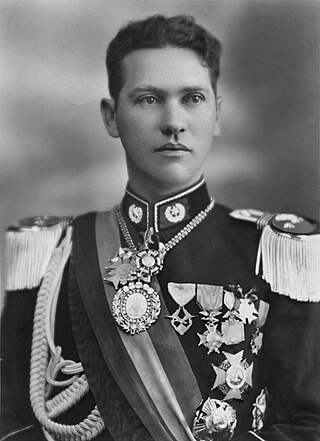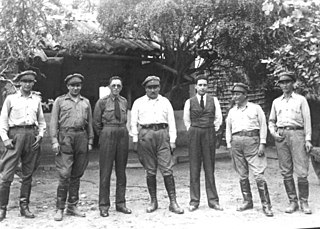| |||||
| Decades: | |||||
|---|---|---|---|---|---|
| See also: | Other events of 1940 History of Bolivia • Years | ||||
Events in the year 1940 in Bolivia .
| |||||
| Decades: | |||||
|---|---|---|---|---|---|
| See also: | Other events of 1940 History of Bolivia • Years | ||||
Events in the year 1940 in Bolivia .

Gualberto Villarroel López was a Bolivian military officer who served as the 39th president of Bolivia from 1943 to 1946. A reformist, sometimes compared with Argentina's Juan Perón, he is nonetheless remembered for his alleged fascist sympathies and his violent demise.

Víctor Germán Busch Becerra was a Bolivian military officer and statesman who served as the 36th president of Bolivia from 1937 to 1939. Prior to his presidency, he served as the Chief of the General Staff and was the Supreme Leader of the Legion of Veterans, a veterans' organization founded by him after his service in the Chaco War.

Carlos Quintanilla Quiroga was a Bolivian general who served as the 37th president of Bolivia on a provisional basis from 1939 to 1940. Quintanilla saw action in the initial stages of the Chaco War (1932–1935) and managed to ascend the echelon of the Bolivian armed forces until he became commander of the army during the administration of Germán Busch. When President Busch committed suicide on 23 August 1939, Quintanilla declared himself Provisional President of the Republic.

Bernardino Bilbao Rioja was a Bolivian officer who served during the Chaco War (1932–35). He pioneered the use of air forces in combat.

Enrique Peñaranda del Castillo was a Bolivian general who served as the 38th president of Bolivia from 1940 until his overthrow in 1943. He previously served as commander-in-chief of the country's armed forces during the second half of the Chaco War (1932–1935).
The Liberal Party was one of two major political parties in Bolivia in the late 19th century and the first half of the 20th century. The other was the Conservative Party. The Liberal Party was formally founded in 1883 by Eliodoro Camacho. The party espoused freedom of religion, a strict separation between church and state, legal acceptance of civil marriages and divorce, and strict adherence to democratic procedures. When the party took power in 1899, it moved the base of the presidency and the Congress to La Paz, which became the de facto capital city. The Supreme Court remained in Sucre. To this day, Sucre is the de jure capital of Bolivia while La Paz acts as the de facto seat of government.

General elections were held in Bolivia on 10 March 1940, electing both a new President of the Republic and a new National Congress. The elections were the first in six years since 1934 and the first not to be annulled in nine years since the general election of 1931.
The Genuine Republican Party was founded in Bolivia in 1921 by José María Escalier and Daniel Domingo Salamanca Urey following a split in the Republican Party.
The Concordance was an electoral political alliance of the right-wing and traditionalist political parties in Bolivia.
The Workers Socialist Party of Bolivia was a Trotskyist political party in Bolivia.

The 1940–42 Bolivian National Congress was a meeting the Bolivian legislature composed of the Chamber of Senators and Chamber of Deputies. It met in La Paz from 12 April 1940 to 1942 during the final four days of the interim government of Carlos Quintanilla and the first two years of the Enrique Peñaranda's presidency.
Bolivia has experienced more than 190 coups d'état and revolutions since its independence was declared in 1825. Since 1950, Bolivia has seen the most coups of any country. The penultimate known attempt was in 1984, two years after the country's transition to democracy in 1982. The most recent attempted coup d'état was in 2024, led by General Juan José Zúñiga.

Gualberto Villarroel assumed office as the 39th President of Bolivia on 20 December 1943, and his term was violently cut short by his death on 21 July 1946. A colonel during the Chaco War, Villarroel and the Reason for the Fatherland (RADEPA) military lodge joined the fledgling Revolutionary Nationalist Movement (MNR) to overthrow President Enrique Peñaranda in a coup d'état.

Enrique Peñaranda assumed office as the 38th President of Bolivia on 15 April 1940, and his term was terminated by a coup d'état on 20 December 1943. A general in the Chaco War, Peñaranda was brought forth by the traditional conservative political parties, sidelined since the end of the Chaco War, as their candidate in the 1940 general elections.

Germán Busch assumed office as the 36th President of Bolivia on 13 July 1937, and his term was cut short by his death on 23 August 1939. A young military officer during the Chaco War, Busch attempted to champion the cause of Military Socialism brought forth by his predecessor David Toro but, unhappy with the results produced by his few reforms, opted to declare himself dictator in April 1939 before committing suicide four months later.

Carlos Quintanilla assumed office as the interim 37th President of Bolivia on 23 August 1939, and his mandate ended on 15 April 1940. A general of the senior officer corps, Quintanilla assumed control of the presidency on an interim basis following the suicide of his predecessor, Germán Busch.

Gabriel Gosálvez Tejada was a Bolivian politician, journalist, economist, and diplomat. Throughout his political career, Gosálvez held various ministerial officers and diplomatic posts as a member of the United Socialist Party. When that party merged into the Republican Socialist Unity Party, Gosálvez was presented as its presidential candidate in the 1951 general election.
The Government Junta of Bolivia was a civil-military junta which ruled Bolivia from 20 December 1943 through 5 April 1944. It consisted of representatives of the armed forces through the Reason for Fatherland (RADEPA) military lodge as well as members of the Revolutionary Nationalist Movement (MNR). The President of the Junta was Colonel Gualberto Villarroel who came to power after a coup d'état which overthrew the government of Enrique Peñaranda. Immediately upon its inception, the junta faced a diplomatic blockade by the United States who viewed the MNR as sympathetic to the fascist powers of World War II and as such led the rest of Latin America in refusing to recognize the new regime until all members of the MNR were removed from the administration. After months of attempted negotiations and the removal of several cabinet ministers, the government finally relented and dismissed all remaining MNR members, dissolving the junta and entrusting Villarroel with the provisional Presidency of the Republic on 5 April 1944.

Eduardo Arze Quiroga was a Bolivian scholar, journalist, politician, and diplomat who served as Minister of Foreign Affairs from 1960 to 1962 in the second cabinet of Víctor Paz Estenssoro. Prior to that, he served in various diplomatic offices in the governments of Enrique Peñaranda and Gualberto Villarroel.

The 1934 Bolivian coup d'état, colloquially known as the Corralito of Villamontes, was a military coup in Bolivia that deposed President Daniel Salamanca in the midst of the Chaco War. Two days before the coup, Salamanca and his presidential delegation arrived at the military headquarters in Villamontes with the intent of removing General Enrique Peñaranda as commander-in-chief of the armed forces and replacing him with General José Leonardo Lanza. In response, on 27 November 1934, army high command directed a group of military officers led by Captain Germán Busch to arrest the president and force his resignation.